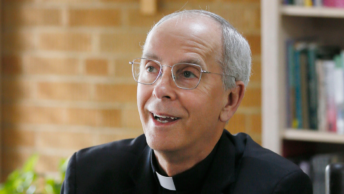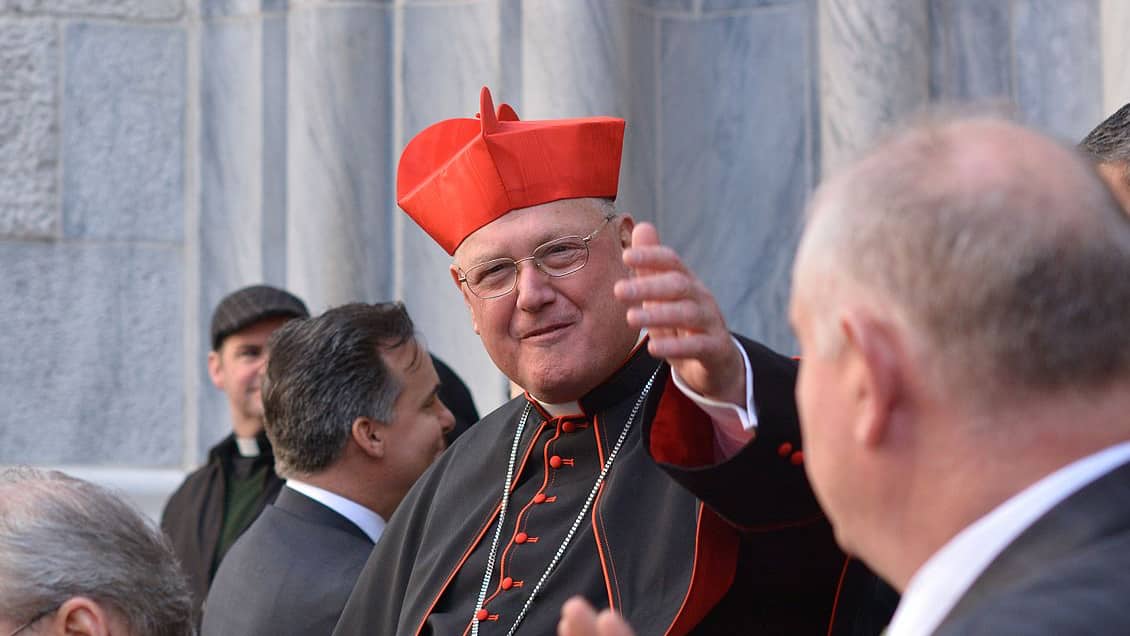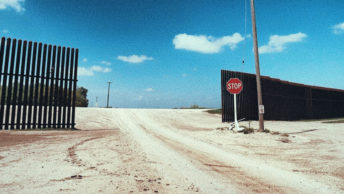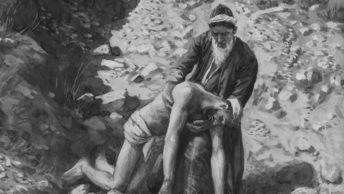 In June, 2014, speaking for the U.S. Conference of Catholic Bishops (USCCB), Bishop Mark Seitz testified before the House Judiciary Committee on the undocumented immigration crisis. In published form, that testimony runs 15 pages.
In June, 2014, speaking for the U.S. Conference of Catholic Bishops (USCCB), Bishop Mark Seitz testified before the House Judiciary Committee on the undocumented immigration crisis. In published form, that testimony runs 15 pages.
Criticizing a document focused on moral theology is risky because the critic can all too easily be dismissed as irreligious, unenlightened, or both. Yet when the moral theology is flawed, as it is in this case, the risk is well worth taking. Although the USCCB document is in some places lofty and insightful, in others it is shallow and misguided.
No thoughtful person will deny the relevance of Christ’s teachings to the plight of immigrants—specifically, His direction to feed the hungry, clothe the naked, welcome the stranger, and care for the oppressed. It is therefore reasonable for the bishops to have chosen this focus and to turn to the works of Popes Pius XII, John Paul II, and Francis for guidance.
What is curious, however, is that the document makes no mention of Pope Leo XIII’s 1891 encyclical Rerum Novarum. The omission is especially unfortunate because that famous work articulates a mature moral perspective that modern bishops, and anyone else concerned with contemporary social problems, could profit from studying.
The key to developing such a perspective is to distinguish between merely quoting scriptural passages or citing ethical ideals (virtues) and analyzing issues in light of them. The latter process entails identifying all the moral obligations, especially conflicting ones, and examining the choices of action and their likely consequences. In this process the bishops have been deficient. To adapt a line from G.K. Chesterton, they have stated the easy part, ignored the hard part, and gone home to their tea (or more bracing beverages). The following examples are among the most important. (The boldface type is my addition.)
The USCCB document defines the illegal immigration problem exactly as the Obama administration does—as a “humanitarian crisis” requiring US government cooperation and funding, specifically for “child welfare services, legal assistance, and access to immigration protection.” Although it speaks of finding “root causes” in the countries of origin and discusses what the countries themselves and “other regional partners” can do to solve the underlying problems, the emphasis is on the US role in these matters. For example, the document makes this recommendation: “The United States should strengthen protections for children from Central America. Unaccompanied minors who arrive in the United States possess legal rights which should be honored.” (Do the authors mean this stipulation to apply universally, even in cases where the “arrival” violates the laws of the country or the rights of the people in whose country the arrival occurred? The document does not address these questions.)
The issue, of course, can be defined differently—as a “border crisis that has raised humanitarian concerns,” but the document disparages that definition and, by implication, the US citizens who hold it. It declares: “The US and its regional partners must avoid the simplistic approach of addressing the forced migration by forcing children back through increased border enforcement. This response is akin to sending these children back into a burning building they just fled. Instead the approach must prioritize protection for those who are displaced from their homes, especially children, the most vulnerable.” (This is hardly a responsible consideration of consequences. The bishops ignore the likely effects of failing to enforce the border—encouraging the countries of origin to continue neglecting their social problems, rewarding the lawless “coyotes” for violating US laws, and most important, subjecting the children to deprivation and physical/sexual abuse during their journey and hardship thereafter.)
The USCCB document devotes considerable space to Catholic social teaching, stressing the idea that all people are created in the image and likeness of God and therefore possess an inherent dignity and fundamental human rights. Citing John Paul II, it claims that illegal as well as legal immigrants possess these rights and the illegals’ rights should be balanced against “the rights of nations to control their borders.” Note that the quoted phrasing compares people’s rights with nation’s rights. Is this a fair comparison? Should it not be the rights of certain people (immigrants) versus the rights of other people (citizens)? More about this when I discuss Rerum Novarum.
Perhaps the most revealing characteristic of the USCCB document is that it speaks almost exclusively about the response of governments and the Catholic Church to the “humanitarian crisis,” but says virtually nothing about the response of American citizens, taxpayers, or even Catholic parishioners. For example, it declares that “the institutional Catholic Church in the United States has played a critical role in the care of unaccompanied children.” That wording is highly misleading. In reality, everything the “institutional Catholic Church” does is financed by citizen’s taxes (awarded in the form of federal grants), by the generosity of Catholic parishioners, or by both. The focus on institutional efforts is therefore an insult to the millions of Americans who actually fund the works of charity and mercy. It is also, in effect if not intent, a subtle denial that legal US residents also possess God-given dignity and rights.
I noted earlier that the USCCB document cites the writings of several popes but ignores Pope Leo XIII’s Rerum Novarum. A brief sampling of Leo’s points will reveal the significance of that omission. (As above, I have used boldface type to highlight important words.)
[Socialists] hold that by . . . transferring property from private individuals to the community, the present mischievous state of things will be set to rights [sic], inasmuch as each citizen will then get his fair share of whatever there is to enjoy . . . [This transfer is] emphatically unjust, for [it] would rob the lawful possessor, distort the functions of the State, and create utter confusion in the community . . . Every man has by nature the right to possess property as his own.
The first and most fundamental principle, therefore, if one would undertake to alleviate the condition of the masses, must be the inviolability of private property.
[Although sharing one’s wealth and other temporal blessings is a requirement of Divine Law], it is a duty, not of justice (save in extreme cases), but of Christian charity—a duty not enforced by human law.
Among the many and grave duties of rulers who would do their best for the people, the first and chief is to act with strict justice . . . toward each and every class alike.
Neither justice nor the common good allows any individual to seize upon that which belongs to another . . . The State would therefore be unjust and cruel if under the name of taxation it were to deprive the private owner of more than is fair.
By omitting any reference to Rerum Novarum, the USCCB document conveniently ignores a theological argument that challenges the bishops’ argument.
If we apply Leo’s ideas to the present US immigration crisis, we will conclude that citizens of the United States are also children of God with fundamental rights that should not be abridged, especially not by the State. Those rights include secure borders and protection from unfair taxation to provide entitlements to illegal aliens. Moreover, again following Leo, we will conclude that, though we all have a debt to our less fortunate neighbors, it is a debt in charity rather than justice, and we are answerable to God, rather than to the government, for its fulfillment.
Even if the US bishops lean toward the thinking of Gustavo Gutiérrez, they are surely familiar with Leo XIII’s landmark encyclical, and they should therefore understand its relevance to the present discussion of illegal immigration. When they dismiss a line of thought consistent with Pope Leo’s insights as a “simplistic approach,” they do Pope Leo, their fellow Catholics, and the Catholic theological tradition a grave disservice. And when they pretend that only their perspective is compatible with Christ’s exhortation to care for those in need, they deepen the offense. US Catholics and their fellow Catholics around the world deserve better from those charged with spiritual leadership.
Copyright © 2014 by Vincent Ryan Ruggiero. All rights reserved
To see more of this author’s work, visit www.mind-at-work.com









The statement by the USCCB is not dogma. It is trying to address what is happening at the southern border of the U.S. It is very weak on the causes of the crisis which does not serve their statement well.
Are we to treat every person with the dignity that is God-given? Absolutely yes. However that is not the issue with the immigrents. People of good will do not want to treat people cruely on either side of the argument. Taking care of those who do cross, we as Christians do have a responsibility to care for them.
However, it does not mean that we are to roll over and let a massive influx of people to cross a soverign border. We have a civil and moral obligation to our nation to protect itself. There are many varied, legitimate, and MORAL ways in which it can be done. Unfortunately, the USCCB statement neglected to mention that important caveat.
We have a moral obligation to address the root cause of this run on the border as it relates to our country’s lack of enforcing legitimate border security and encouragement of immigrants to dis-regard our laws on immigration. For example, the political and domestic situations in Central America has not collapsed to cause the mass leaving. It was caused by this government’s signal that our immigration laws would not be enforced.
In effect, our country is the cause of the mass immigration and the potential collapse of services and the rule of law. In my opinion, the USCCB should be drafting a statement on the legitimate discussion on how best to solve this situation.
I am highly suspect of the folks who demand the Little Sister’s of the Poor to supply abortifiencts as a ‘right’ to come up with a reasonably moral immigration plan. As Catholics, both clergy and lay, we must demand all rights be protected.
[…] almost said “obsessively promoting post-conciliar ethos.” A really good post by an author I’ve not read before, who explores how the USCCB’s selective reading of the dogmatic Magisterium has led it to […]
This ‘crisis’ is a God-send to the Bishops because it allows them to claim the moral high ground while filling their coffers with tax-payers money.
The Novus Ordo NewChurch wants to retain the institutions of the Church while bucking tradition, which really is the Faith of Our Fathers.
Once the Church gets its worship correct, charity will flow naturally and society, under the Kingship of Christ will not need big government to steal people’s money to give it to others under the name of welfare.
Stealing from one person to give it to another just perpetuates the sin, encouraging people to break the law and enter a country illegally is also a sin.
Sending law breakers back home to their country is the wisest decision because it encourages them to contribute to solve their own country’s problems rather than contribute to the problems of a host country.
I always reduce it to the level of the individual, if you aren’t invited into someone’s house you have no right to enter and request a meal.
Rod,
Do you know how many defective Catholic hierarchy choices occurred simultaneously with the Latin Mass and ad orientem…which was said by two Renaissance Popes who had offspring as Cardinals…Popes Alexander VI and Julius II.
Bill: You’re changing the subject. Latin Mass (which you obviously disdain) was proclaimed to be celebrated IN PERPETUITY). Is the Novus Ordo Mass with its’ pedophiles to be praised and TLM condemned? This has to do with sins of individuals, not the Mass. Don’t change the subject with a flawed attack on the Mass.
Galatians 1:8
Douay-Rheims Bible
“But though we, or an angel from heaven, preach a gospel to you besides that which we have preached to you, let him be anathema.”
Thomas Aquinas in his Summa also spoke of the rights of nations.
Lawlessness always brings with it, a state of anarchy. Though they cannot see it, this is what the bishops are promoting. The moment illegals set foot on our soil, they are breaking the law. Anyone who promotes this is leading us into anarchy. My parents, RIP, came from Mexico LEGALLY. They would roll their eyes and shake their heads in shame if they could see what their fellow Mexicans are creating with their lawlessness. This is what true human dignity is about: obeying the laws of another country, not taking what belongs to another (taxpayers), but meriting it by hard work and respect for that countries laws.
Last time I checked, Bishop Seitz is a member of the Magisterium. Are you?
So in 1454, you would have agreed with Pope Nicholas V in Romanus Pontifex mid 4th large par. that Portugal could invade South America and enslave any native that resisted the gospel? John Paul apologized for it. In 1520, you would have agreed with Pope Leo X who affirmed the burning of heretics in Exsurge Domine…heretics you now trust with fixing your car brakes? St. John Paul apologized for it.
David…do your own list of what unquestioning obedience in the non infallible leads to logically throughout history.
The Bishops SHOULD also be familar with number 2241, Catechism of the Catholic Church which delineates responsibilites of immigrants to host countries. In my copy of the catechism, however, that paragraph is in smaller typeface than the preceding one which outlines the obligations of host countries. Is it the point of the magisterium, in printing the two sets of obligations in different sized type, to imply that immigrants have GREATER rights than host nations ? If so, is that some sort of endorsement of anarchy ? That is, migrants have more of a right to go and do what they please than hosts have to govern their own property ? — sign me B.A. in economics from a Catholic college (which is probably more economics than the clergy study in all their years of training I hate to say — unfortunate since they constantly hold themselves up as authorities on the socio-economic and political spheres)
[…] – Fr. Dwight Longenecker Pope Francis Greets Evangelicals as Brothers – Edward Pentin USCCB Misrepresents Social Teaching on Immigration – V. R. Ruggiero Are Protestant Communities “Churches”? – Wade St. Onge, Cth Lan A […]